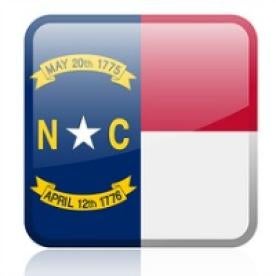GAMBLING PROPOSAL DEBATED
If a proposal to dramatically increase gambling in North Carolina is to become law this year, it must be included in the new state budget that lawmakers hope to pass next week, said Senate leader Phil Berger (R-Rockingham) on Thursday.
However, House Speaker Tim Moore (R-Cleveland) reportedly informed his fellow Republicans that he lacked the GOP votes to pass a budget that included expanded gaming, according to an email sent Wednesday night and obtained by WRAL. "To be clear we will not pass a budget that does not have 61 Republican votes," Moore wrote to his members at 9:23 p.m. Wednesday. "As you can see, there are not 61 Republicans willing to vote for the budget if it includes gaming."
Moore has repeatedly stated that unless at least half of House Republicans support a gambling expansion, which could increase state revenue by billions as casinos and video lottery terminals are taxed, it will not go forward. Demi Dowdy, a representative for Moore, said on Thursday that, “The gaming issue would require further caucus consideration before it could be included as part of the state budget.”
The proposal, which is still being worked out behind closed doors, would allow for the establishment of new commercial casinos in the state as well as the legalization of video lottery terminals — consoles that resemble slot machines — which the state has been trying to ban from state restaurants and gas stations for years with varying degrees of success.
According to Berger, there are no plans to consider the two gambling-related issues separately from one another or as a stand-alone bill apart from the state's $30 billion budget plan. Instead, they have been incorporated into the budget. Berger said, “I just don't see gaming going forward as a separate deal. I think it's either in the budget, or we don't have a particular pathway as far as gaming.”
Other than a draft casino bill that was leaked in June, no specifics of the gambling plan have been made public. According to Berger, the budget will likely be unveiled early next week, along with the final budget proposal. It is unclear where or how many video lottery terminals would be permitted if the agreement were to be finalized. A plan to legalize tens of thousands of terminals in establishments with alcohol licenses has at least one lawmaker's support.
While lawmakers met in a lengthy, behind-closed-doors meeting on Tuesday, social conservatives, business operators, and political candidates held a press conference outside the Legislative Building to urge lawmakers to reject efforts to permit more casinos and legalize statewide video gaming machines. The gambling opponents bemoaned the absence of public discussion of any gambling proposal. “Our representatives have the chance today to stand up and show that they represent their citizens in their respective counties by allowing our citizens to have a voice in the destiny and values in their communities where they live,” said Rockingham County Sheriff Sam Page, who is also running for lieutenant governor next year.
Read more by The Associated Press
VOTE ON ELECTIONS BILL DELAYED
An attempt to change political control over the election laws for North Carolina — in 2024 and beyond — was unexpectedly delayed on Tuesday. Representative Destin Hall (R-Watauga), chairman of the House Rules Committee, announced that the vote would be postponed until at least next week. Republican state lawmakers had hoped to advance a bill that would transfer power of state and local election boards.
Tuesday, liberal activists and pro-democracy organizations gathered at the legislature to hold a press conference criticizing the bill. The bill has already been approved by the Senate on a party-line vote. The hearing on Tuesday follows another bill that would have implemented stricter guidelines for voting by mail but was vetoed by Governor Roy Cooper last month.
No immediate explanation was given for the delay. When the decision was made to postpone the vote, there was a significant police presence at the legislature as some groups had indicated their intention to disrupt the voting session in protest.
The bill's Republican sponsors claim that Senate Bill 749 is essential to increase public confidence in the fairness of elections. Election officials, however, are opposed to the legislation, claiming that if it is passed, it will lead to chaos and inaction, harming rather than enhancing public confidence in the integrity of elections.
The state's long-standing custom of giving the party in power of the governor's office a majority on both the State Board of Elections and the individual county election boards would be abolished under the now-delayed elections bill. Because Governor Roy Cooper is a Democrat, Democrats currently hold a 3-2 advantage on the state and local election boards.
According to the proposed legislation, boards would be equally split between the two major political parties, with an equal number of members from each.
Republican lawmakers claim that any system in which one party controls the electoral rules will engender an inherent mistrust among voters. Democrats, however, claim that neither party's control of the elections board has resulted in any evidence of actual wrongdoing, pointing out that Cooper won the governor's race in 2016 when the elections board was controlled by Republicans and that then-president Donald Trump, a Republican, won North Carolina in 2020 when the elections board was controlled by Democrats.
ABC BILL ADVANCES
Although its future is uncertain, a significant overhaul of North Carolina's alcohol laws that would permit Sunday liquor sales and happy hour drink specials passed a crucial hurdle on Tuesday at the statehouse.
Senate Bill 527 would lift a statewide ban and permit local governments to open their ABC stores on Sundays no earlier than 10 a.m. On days off — aside from Christmas and Thanksgiving — they would have the same choice.
Happy hour restrictions imposed by the state would also be lifted, enabling local officials to make the change by passing an ordinance.
A pandemic-era regulation allowing restaurants to sell mixed drinks to go and for delivery would also be reinstated by the measure. Another part of the bill lowers alcohol taxes for a Durham company that wants to send whiskey into space.
Additionally, the bill would streamline the sales and permit procedures for eateries and other ABC permit holders, as requested by the community. For instance, businesses currently have to purchase their liquor exclusively from a specific warehouse, which can be problematic when that warehouse runs out of a particular liquor. This legislation would relax that law.
A new clause was added to the bill on Tuesday, allowing community colleges to sell beer and wine at sporting events, just as the legislature had done for universities in 2019.
On a unanimous vote, the measure passed the House Alcoholic Beverage Control Committee on Tuesday, despite two committee members' complaints that the bill does not include the amendments the state's craft distillery industry has been asking for. Before going to the floor for a vote by the entire House, the bill is expected to pass through two more House committees.
RENEWABLE ENERGY VERSUS CLEAN ENERGY
The North Carolina General Assembly is currently considering a bill that would remove the term "renewable energy source" from the state law governing public utilities and replace it with the term "clean energy source," with the caveat that "clean energy" includes nuclear power.
Senate Bill 678 permits Duke Energy and other utilities to use nuclear power to reach a target of 12.5 percent clean or renewable energy, a target that was previously attained using resources like solar, wind, or biomass, among others. According to the new law, electric cooperatives must generate 10 percent of their energy from clean, renewable sources.
Nuclear power was expressly prohibited from being used to meet North Carolina's renewable energy portfolio standard in the legislation that established it. The bill's sponsor, Senator Paul Newton (R-Cabarrus) told The News & Observer that the modification is in line with the state's aim to lower carbon dioxide emissions from power generation.
Also modified by Senate Bill 678 is the requirement that any new coal or nuclear power plant demonstrate that it is less expensive than energy efficiency measures or demand-side resources like rooftop solar and battery storage. According to Newton, this equalizes the chances of considering nuclear energy with other resources.
The law mentions the two methods of generating energy from nuclear sources: fusion, which produces energy by fusing atoms together using a laser, and fission, which is the conventional method in which uranium atoms are typically split to produce energy. Fusion has only been accomplished twice, and it won't be practical as a major energy source for many years.
A version of Senate Bill 678 was approved by the North Carolina House of Representatives in August with substantial bipartisan support; it was then sent back to the Senate with some modifications, such as extending the closure dates of some Duke coal ash ponds and raising the cap on a rooftop solar leasing program.
Instead of voting to concur, the Senate referred the bill to its Rules Committee.





 i
i


